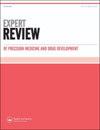表型严重哮喘:生物治疗的基本原理
IF 1.2
Q4 PHARMACOLOGY & PHARMACY
Expert Review of Precision Medicine and Drug Development
Pub Date : 2020-06-07
DOI:10.1080/23808993.2020.1776106
引用次数: 5
摘要
哮喘是一种复杂的疾病,在病因、触发因素、临床特征和对药物治疗的不同反应方面具有异质性。严重不受控制的哮喘患者占相对较小的百分比,占所有哮喘患者的5%至10%。这些患者可以从近年来发展的靶向生物疗法中获益。事实上,更好地了解不同表型和内源性哮喘的病因病理机制已经导致了创新生物疗法的可用性,能够通过靶向气道炎症相关分子来改变疾病的自然史。基于临床和生理变量和炎症标志物的几种表型已被报道。专家意见首先要确定这种疾病背后的分子过程。在这种情况下,对T2和非T2炎症途径的识别,即所谓的分子表型,代表了驱动新型生物疗法使用的最可靠方法。为此,已经验证了几种生物标志物用于识别严重哮喘表型并指导选择最合适的治疗方法。本综述的目的是讨论目前关于严重哮喘分子表型的知识,以及现有生物药物使用的基本原理。本文章由计算机程序翻译,如有差异,请以英文原文为准。
Phenotyping severe asthma: a rationale for biologic therapy
ABSTRACT Introduction Asthma is a complex disease with heterogeneity in etiology, triggers, clinical characteristics and different responses to pharmacological therapies. Areas covered Patients with severe uncontrolled asthma constitute a relatively small percentage, ranging from 5 to 10% of all asthmatics. These patients can benefit from targeted biological therapies developed in recent years. In fact, a better understanding of the etiopathological mechanisms of different phenotypes and endotypes of severe asthma have led to the availability of innovative biological therapies, able to modify the natural history of the disease by targeting molecules involved in airway inflammation. Several phenotypes based on clinical and physiologic variables and on inflammatory markers have been reported. Expert opinion The priority is to define the molecular process underlying the disease. In this context the recognition of T2 and non T2 inflammatory pathways, so called molecular phenotypes, represents the most reliable approach to drive the use of novel biological therapies. For this purpose, several biomarkers have been validated for identifying severe asthma phenotypes and for guiding the choice of the most appropriate treatment. The purpose of this review is to discuss the current knowledge about the molecular phenotypes of severe asthma, as well as the rationale underlying the use of existing biological drugs.
求助全文
通过发布文献求助,成功后即可免费获取论文全文。
去求助
来源期刊

Expert Review of Precision Medicine and Drug Development
PHARMACOLOGY & PHARMACY-
CiteScore
2.30
自引率
0.00%
发文量
9
期刊介绍:
Expert Review of Precision Medicine and Drug Development publishes primarily review articles covering the development and clinical application of medicine to be used in a personalized therapy setting; in addition, the journal also publishes original research and commentary-style articles. In an era where medicine is recognizing that a one-size-fits-all approach is not always appropriate, it has become necessary to identify patients responsive to treatments and treat patient populations using a tailored approach. Areas covered include: Development and application of drugs targeted to specific genotypes and populations, as well as advanced diagnostic technologies and significant biomarkers that aid in this. Clinical trials and case studies within personalized therapy and drug development. Screening, prediction and prevention of disease, prediction of adverse events, treatment monitoring, effects of metabolomics and microbiomics on treatment. Secondary population research, genome-wide association studies, disease–gene association studies, personal genome technologies. Ethical and cost–benefit issues, the impact to healthcare and business infrastructure, and regulatory issues.
 求助内容:
求助内容: 应助结果提醒方式:
应助结果提醒方式:


